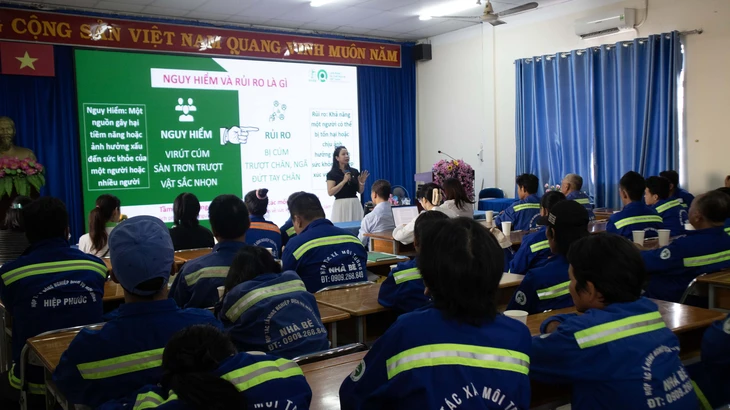The Packaging Recycling Organization Vietnam (PRO Vietnam), in collaboration with the Environmental and Development Action in Vietnam (ENDA), has provided support packages for informal waste collectors (IWCs) in Ho Chi Minh City, aiming to improve their working conditions and occupational safety.
 Mr. Nguyen Gia Huy Chuong – Executive Director of PRO Vietnam – presented personal protective equipment (PPE) to the informal waste collectors. Photo: PRO Vietnam.
Mr. Nguyen Gia Huy Chuong – Executive Director of PRO Vietnam – presented personal protective equipment (PPE) to the informal waste collectors. Photo: PRO Vietnam.
Ms. Nguyen Thi Hoai Linh – Chief Representative of ENDA Vietnam – stated that waste collection is among the 10 most dangerous professions in the world (according to Listland.com, 2019), as workers face a series of potential threats daily.
Ms. Linh specified the six largest categories of hazards that informal waste collectors frequently encounter, including:
 Ms. Nguyen Thi Hoai Linh stated that waste collection is among the 10 most dangerous professions in the world, but in Vietnam, these workers still lack adequate protection and recognition. Photo: PRO Vietnam.
Ms. Nguyen Thi Hoai Linh stated that waste collection is among the 10 most dangerous professions in the world, but in Vietnam, these workers still lack adequate protection and recognition. Photo: PRO Vietnam.
“Without self-protection measures, these risks will quickly turn into direct health consequences, affecting you and your families,” Ms. Linh emphasized during an occupational safety training session.
Speaking at the Occupational Health and Safety Training workshop hosted by PRO Vietnam and ENDA, Mr. Nguyen Gia Huy Chuong – Executive Director of PRO Vietnam – expressed appreciation for the silent contributions of IWCs. According to him, these workers play a crucial role in maintaining the clean, beautiful, and civilized appearance of urban areas.
 Mr. Nguyen Gia Huy Chuong affirmed that PRO Vietnam is committed to accompanying informal waste collectors through in-kind support activities and practical training sessions. Photo: PRO Vietnam.
Mr. Nguyen Gia Huy Chuong affirmed that PRO Vietnam is committed to accompanying informal waste collectors through in-kind support activities and practical training sessions. Photo: PRO Vietnam.
Speaking at the workshop, Mr. Chuong emphasized: “From its inception, PRO Vietnam has always defined its mission as promoting a circular economy model through building a sustainable packaging collection and recycling system.”
“We appreciate and highly value the contributions of IWCs in the waste management system. You are the fundamental link, helping to bring the hidden resources within waste to collection points, where they can then be recycled and given a new life cycle,” the representative shared.
To support this workforce, in recent years, PRO Vietnam, in collaboration with the ENDA, has provided numerous support packages such as providing PPE (clothing, boots, gloves), accident insurance and health insurance, offering a revolving fund. However, Mr. Chuong stated: “Equipment is merely an external solution; more important are self-protection awareness and professional skills.”
Therefore, the program does not stop at providing physical items but also organizes occupational safety and exposure prevention training for IWCs. Participants are provided with protective knowledge and skills. This is also an opportunity for them to meet and listen to practical experience shared by workers with over 20-30 years of experience in the profession. According to Mr. Chuong, this is a “living curriculum” that helps the waste collection profession become safer and more sustainable.
“We hope that the informal waste collectors present at today’s training session will acquire practical knowledge and reduce risks in their daily work. PRO Vietnam believes that with the support of organizations, businesses, and society as a whole, the informal waste collection workforce will be increasingly recognized, supported, and developed more sustainably,” affirmed Mr. Chuong.
In 2025, PRO Vietnam implemented numerous support packages for IWCs.
Over 1,300 accident insurance packages and more than 2,400 sets of PPE were handed directly to IWCs at environmental cooperatives in Ho Chi Minh City. Notably, nearly 500 workers participated in a series of specialized training sessions on occupational safety and infection prevention during collection, thereby raising awareness and reducing risks in the workplace.